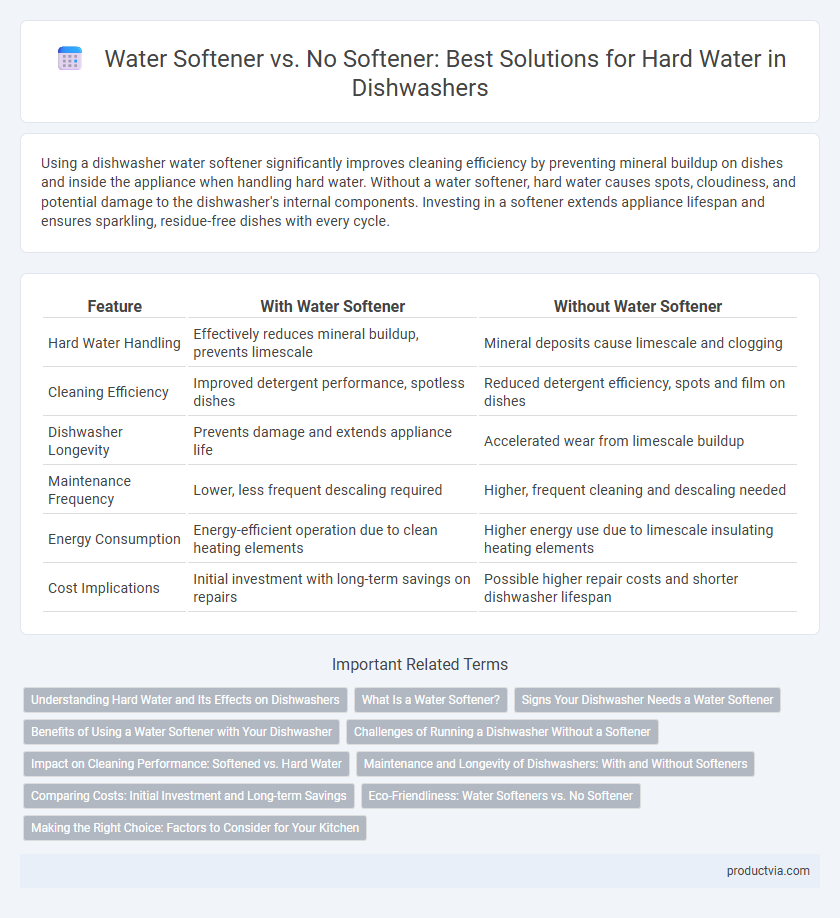Using a dishwasher water softener significantly improves cleaning efficiency by preventing mineral buildup on dishes and inside the appliance when handling hard water. Without a water softener, hard water causes spots, cloudiness, and potential damage to the dishwasher's internal components. Investing in a softener extends appliance lifespan and ensures sparkling, residue-free dishes with every cycle.
Table of Comparison
| Feature | With Water Softener | Without Water Softener |
|---|---|---|
| Hard Water Handling | Effectively reduces mineral buildup, prevents limescale | Mineral deposits cause limescale and clogging |
| Cleaning Efficiency | Improved detergent performance, spotless dishes | Reduced detergent efficiency, spots and film on dishes |
| Dishwasher Longevity | Prevents damage and extends appliance life | Accelerated wear from limescale buildup |
| Maintenance Frequency | Lower, less frequent descaling required | Higher, frequent cleaning and descaling needed |
| Energy Consumption | Energy-efficient operation due to clean heating elements | Higher energy use due to limescale insulating heating elements |
| Cost Implications | Initial investment with long-term savings on repairs | Possible higher repair costs and shorter dishwasher lifespan |
Understanding Hard Water and Its Effects on Dishwashers
Hard water contains high levels of minerals like calcium and magnesium, which cause scale buildup inside dishwashers, reducing their efficiency and lifespan. Dishwashers with built-in water softeners prevent mineral deposits by chemically treating hard water, enhancing cleaning performance and protecting internal components. Without a softener, hard water often leads to spotty dishes, clogged spray arms, and increased energy consumption due to scale formation.
What Is a Water Softener?
A water softener is a device that removes minerals like calcium and magnesium from hard water, preventing scale buildup in dishwashers. This process ensures improved cleaning performance and extends the appliance's lifespan by reducing mineral deposits on dishes and internal components. Using a dishwasher without a softener in hard water areas often leads to cloudy dishes and increased maintenance needs.
Signs Your Dishwasher Needs a Water Softener
White spots on dishes and cloudy glassware often indicate hard water mineral buildup, signaling the need for a water softener in your dishwasher. Frequent lime scale deposits around the spray arms and interior walls reduce cleaning efficiency and suggest hard water is affecting performance. If soap doesn't dissolve properly or residue remains after cycles, installing a water softener can enhance dishwasher longevity and cleaning results.
Benefits of Using a Water Softener with Your Dishwasher
Using a water softener in your dishwasher significantly reduces limescale buildup caused by hard water, improving appliance longevity and efficiency. Softened water enhances detergent performance, resulting in cleaner dishes with fewer spots and film residues. This system also lowers the risk of clogged jets and heating elements, reducing maintenance costs and energy consumption.
Challenges of Running a Dishwasher Without a Softener
Running a dishwasher without a water softener in areas with hard water leads to mineral buildup on dishes and interior components, reducing efficiency and lifespan. Limescale deposits can cause clogged spray arms and heating elements, increasing energy consumption and maintenance costs. Stubborn water spots and cloudiness on glassware are common, diminishing cleaning performance and user satisfaction.
Impact on Cleaning Performance: Softened vs. Hard Water
Using a dishwasher with a built-in water softener significantly improves cleaning performance by preventing mineral buildup and spotting caused by hard water. Softened water enhances detergent efficiency, resulting in spotless dishes and reducing residue compared to hard water, which can leave white deposits and dull finishes. Neglecting a softener in areas with hard water often leads to increased maintenance and less effective washing cycles.
Maintenance and Longevity of Dishwashers: With and Without Softeners
Dishwashers equipped with water softeners experience reduced lime scale buildup, resulting in lower maintenance frequency and longer appliance lifespan. Hard water without softener treatment causes mineral deposits that clog spray arms and wear heating elements, increasing repair costs and shortening dishwasher longevity. Regular regeneration of the softener resin ensures optimal performance and protects critical components from hard water damage.
Comparing Costs: Initial Investment and Long-term Savings
Dishwashers with built-in water softeners have a higher initial investment, typically ranging from $300 to $600 more than models without softeners. Over time, softened water reduces mineral buildup, decreasing repair costs and extending dishwasher lifespan, which can result in long-term savings of up to 25% on maintenance expenses. Models without water softeners may save on upfront costs but often face increased expenses due to frequent descaling and potential damage from hard water deposits.
Eco-Friendliness: Water Softeners vs. No Softener
Water softeners in dishwashers reduce mineral buildup, enhancing detergent efficiency and lowering water and energy consumption, which contributes to eco-friendly operation. Without a water softener, hard water causes limescale deposits that increase detergent usage and energy demands, resulting in higher environmental impact. Selecting a dishwasher with a built-in water softener minimizes chemical use and prolongs appliance lifespan, promoting sustainable kitchen practices.
Making the Right Choice: Factors to Consider for Your Kitchen
Choosing a dishwasher with a built-in water softener is essential for homes with hard water to prevent mineral buildup and extend appliance lifespan. Dishwashers without softeners may require frequent descaling and use of specialized detergents to combat limescale stains and maintain cleaning efficiency. Consider water hardness level, maintenance preferences, and budget to determine if investing in a water softener-equipped dishwasher is the best solution for your kitchen.
Water Softener vs No Softener for Hard Water Handling Infographic

 productvia.com
productvia.com